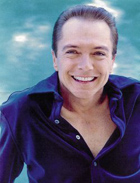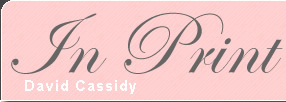
Message to The World
A&U Magazine, December 1999 issue
Pop Icon and Former Teen Idol, David Cassidy, talks with A&U’s Dann Dulin about loss and hope
He stood me up! Although, not intentionally. Entangled in a Los Angeles casting meeting for his new TV movie, The David Cassidy Story, to be aired on NBC in early 2000, David Cassidy missed two prior interviews. Embarrassed, he phoned and apologized profusely and sincerely. This is the third time. A Charm?
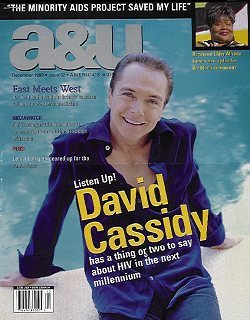
As the large, ivory-colored gates to his Las Vegas home lazily open, I drive along the circular driveway, and park near the wood-framed glass entry doors. The grounds are thick with pine trees and foliage. It's a home in the forest. The architecture is basically wood and stone, set in an eclectic style with colonnades.
His assistant, Robyn, and a barking dachshund named Chance escort me through the arched entry-way. We travel through a maze of hallways and stairs, a freshly cemented backyard patio and unopened moving boxes. Cassidy and his wife of ten years, songwriter Sue Shifrin, and their son, Beau, age eight, have just moved in. We arrive at the back of the house and I settle into Cassidy's rustic office. Large wood beams stretch across the high ceiling, and French doors open onto a balcony overlooking the pool and Jacuzzi and a complete playground: swings slides, treehouse, trampoline, teeter-totter, and sandbox. The airy room embodies a fireplace, gigantic screen TV, a wooden desk topped with a framed photo of Beau, and tan leather sofas with embroidered pillows.
Within a few minutes, neatly groomed David leisurely strolls into the living room dressed in a deep blue velour shirt and snug black denims that fit his lean, slender frame. His magnetic greenish-blue eyes are his most captivating features, which are accented by dark lashes. His hair tightly slicked with a few thin streaks of gray, and his ear is pierced, but no earring. The open-collared shirt reveals a few hairs on his smooth chest. There is an androgynous quality about him. Although he will be fifty next year, he still has that boyish face, which makes him look much younger than his actual age. David greets we warmly. He grabs bottled water and sits on the sofa. He confides that he had a scratchy throat earlier in the morning, probably due to stress. He flew back home late last night from daylong meetings in Los Angeles. 'My neck's like a vice,' he asserts. He took an antihistamine prior to the interview. He is somewhat sleepy.
'We were just talking about all the names, unfortunately all boys, who are gone,' Cassidy says referring to an earlier conversation that day with a friend, recalling all the people they've known who have died of AIDS. 'We were talking about people that touched our lives - where the talent pool was so vast. It's depressing to talk about it.' In 1981, when AIDS wasn't even a label, Cassidy was performing on Broadway in Little Johnny Jones. A dancer, also named David, became ill. 'He kept going to doctors and no one could figure out what was wrong with him. David was someone who frequented lots of the bars. He was a fabulous dancer, and had an interesting dual personality. He was completely into football - serious football.' They would huddle together in Cassidy's dressing room to watch the games between shows. David died six months after the show ended, but Cassidy didn't find out until a year later. Three other guys, also from the show, died soon after. Two years later, Cassidy was back on Broadway in Joseph and the Amazing Technicolor Dreamcoat when a singer took ill during the run of the show. Three months later, he too was dead. Then in 1984, Cassidy discovered that a heterosexual male friend of his in California contracted AIDS through blood transfusion. He spent several days with his friend before he died. This was David's introduction to the AIDS drama.
'In the early stages we were all very ignorant and very frightened. The heterosexual community reacted homophobically. The media acted homophobic. It became what the Bible Belt referred to as the 'gay plague'; that God was punishing gay people,' he says gulping a swig of water. 'My growing concern during the eighties became public awareness. As we were learning the various ways it reared its ugly head and how it affected so many of my friend's lives it became apparent that the public was not in any way educated. I have to say that there have been an awful lot of people who have worked to raise people's consciousness about AIDS having no boundaries.'
AIDS has landed at David's front door. He has a close friend who is living with AIDS. 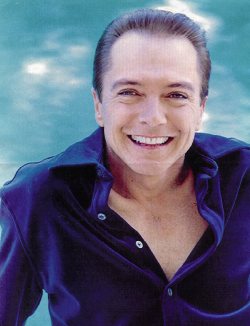 How does he deal with that? 'Compassion, love, support, friendship, openness, reveal, talk about it, don't hide,' he specifies, being no stranger to suffering. Loss first befriended David at the early age of three when his father, actor Jack Cassidy, and his mother, actress Evelyn Ward, divorced. 'My life has been filled with many losses. Most of the analysis that I've been through in the past six years has dealt with loss. It came in waves for me. Both as a child, and then as a young adult with the loss of my own identity and the loss of my fortune of money. The direction in which I had set out was to be a creative person, artist, and actor, but then I became this thing [pop idol] and suddenly no one could see me as just anything but that. Therein lies my creative and artistic frustration. I never felt bitter about any of it,' says David. 'I will never be all cried out though. The wounds, the pain, the loss that one goes through losing someone. Without the life that they had, without the contribution to my life, I would not be anywhere near as rich a person as I am now. So I view it as a gift to have known, to have experienced, to have loved, to be blessed. And my life, look around, is blessed.'
How does he deal with that? 'Compassion, love, support, friendship, openness, reveal, talk about it, don't hide,' he specifies, being no stranger to suffering. Loss first befriended David at the early age of three when his father, actor Jack Cassidy, and his mother, actress Evelyn Ward, divorced. 'My life has been filled with many losses. Most of the analysis that I've been through in the past six years has dealt with loss. It came in waves for me. Both as a child, and then as a young adult with the loss of my own identity and the loss of my fortune of money. The direction in which I had set out was to be a creative person, artist, and actor, but then I became this thing [pop idol] and suddenly no one could see me as just anything but that. Therein lies my creative and artistic frustration. I never felt bitter about any of it,' says David. 'I will never be all cried out though. The wounds, the pain, the loss that one goes through losing someone. Without the life that they had, without the contribution to my life, I would not be anywhere near as rich a person as I am now. So I view it as a gift to have known, to have experienced, to have loved, to be blessed. And my life, look around, is blessed.'
His father has been an underlying current for David throughout this life. 'I was abandoned by a father who was incapable of being there for me and now I have healed myself through my own son and my own analysis. And had I known then what I know now about life and perspective, had I been this guy in 1976 when my father died, I would not have been estranged from him. I would have been able to live with his short-comings, and would have been honest with him, which was very difficult for me to do [It was also difficult] for all of my brothers, my stepmother, and my mother. Because if you didn't see the world the way he wanted you to see it, he dismissed you.' The more success David found, the more alienated his father became. David merely wanted his father to be proud of him, but Jack Cassidy could not bear the recognition and popularity that his son was gaining. Practically the only thing they both agreed upon was the music of Bobby Darin, whom David ironically impersonates in his Vegas revue, The Rat Pack is Back!
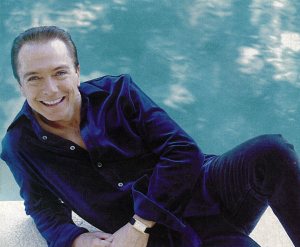
'My father was very narcissistic, as was my mother, but fortunately my mother had enough maternal love, instinct and goodness in her to see that she had a little boy that really needed his father and needed parenting. She came from solid stock. My mother wasn't a nut, and she wasn't emotionally disturbed like my father, who was also an alcoholic. He was a wonderful human being. I worshipped the ground he walked on. He was crazy, but part of his madness was his gift. The madness just enhanced it. He was so talented, so creative, gifted, handsome, and a great singer. He could decorate, do things with his hands, he could draw, he could write. It's intimidating,' he laughs demurely. 'He was good at everything. If you put [my brothers] Shaun, Patrick, Ryan, and me together in this room you would probably have all of what he had in his body.
David Cassidy had it too. Utter his name and it evokes some strong images. Long, shaggy hair. Bedroom eyes. A charismatic smile. The Partridge Family. Squealing fans darting onstage during the pop singer's sold-out stadium concerts. The number one song, 'I Thing I Love You.' His image plastered on teen mags, album covers, lunchboxes, notebooks, T-shirts, beach towels, and posters that hung on bedroom walls.
Dave Madden, who played Reuben Kinkaid on The Partridge Family, comments in one of the Cassidy bios, 'Fame is a prison. The more famous you are, the smaller your world becomes and that's not any fun.' I ask David if he agrees. 'Yes, that's very true. As my career got bigger and bigger, my life got smaller and smaller. I lived in this little vacuum. It closed in and shut me off. It shut me out of life - totally.' He was forced to limit his activities. He would only travel from his car, to his house, to his room. 'There were people around me all the time. I couldn't even go to the bathroom alone! It's weird, very strange. Anyway, that's the past.'
Cassidy says it is a compliment to have the resurgence of interest in his life. Although he never really faded away, he just conquered new challenges. He received an Emmy nomination for his acting performance in the TV movie, A Chance to Live. He starred on Broadway in Blood Brothers with his brother, Shaun, and Petula Clark. And he performed in London's West End theater district.
Presently, there are several Cassidy bios being aired on television. 'It's been quite flattering to have people continually talking about the phenomena of you. Try and put yourself in that position for a moment, then you go, 'Pooh, yes, I'm phenomenal, but I'm just a guy. I'm just a guy. It's just life. And God, I'm lucky,'' he says with his head laid back propped by a pillow looking up to the ceiling flashing that toothpaste-commercial smile. Of the bios being televised, Cassidy has only seen VH1's David Cassidy: Behind the Music, in which he participated in the making of the production. The adventure was quite cathartic for him. The other bio producers never pitched him for his approval, so he doubts the accuracy of their facts. He does not endorse them.
Do you have any advice for the latest pop idol, Ricky Martin? 'Take control. Don't lose your perspective! But I suspect he will; we all do to some degree. Question is how quickly can you get a hold of it again. What is your purpose? Is it to become rich and famous and a sex symbol?' He pauses a moment and quietly laughs. 'I've been through the fire so many times; seen people come and go - I can't take any of it seriously. Being a pop idol is a shallow existence; there's not a whole hell of a lot to it. You have to look good, walk around and feel your ass a lot. Keep your tan up. Your tan is important!'
Nowadays his 'tan' is not that important. His son takes precedence and Beau has helped to maintain the balance in David's life. As he speaks about his son, he is concerned that it doesn't sound contrived. 'Some of us heal our wounds with our children. And for me, I've done a lot of healing with my son. So, he's the light in my life, and he's the new and improved model,' radiates the proud pop.
In five years, Beau will be an adolescent. 'I will be honest with the issues of drugs, violence, and AIDS. I will emphasize for him to be careful and safe. It doesn't take a lot of responsibility, [although] in the heat and passion of the moment, as we all know, it's difficult.' He takes on a juvenile voice, ''I just didn't happen to bring my Durex, so now what do we do?' [It's important to] have the foresight to think ahead and say, 'Is there a possibility that I might sleep with someone tonight?' It doesn't take much to be careful. 'David wants Beau to bask in a full life, and is not concerned about his son being capricious. 'My son is much brighter than I am. He's got his mother's sensibility. I was wild and reckless. I would probably be dead had I lived twenty years later. Had I lived through the eighties, as I had in the sixties, I'd be gone,' he says while dabbling with his copper bracelet. ''m not a good guy when it comes to consciousness-altering stuff. I like being in the present. I've lost too many friends of mine to substance abuse from the time I was seventeen.' When Cassidy racked up his first hit, his best friend died of an overdose.
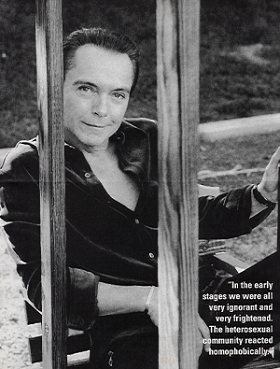
Cassidy keeps healthy and fit, but his physique is at peak form when he performs ten shows a week as he did for two years in the MGM Grand's extravaganza, EFX, which ended a year ago. In the eighties, he used to be a gym addict (the only thing he was ever addicted to, he says, besides music and merriment), working out six days a week plus running three to five miles daily. He has no interest in that now. 'I never had big muscles. I wasted months of my life in there - months. I could have been hanging out, smoking a cigar, and having a drink!' He can't jog now because of bad knees and foot surgery that he underwent this year. 'Basically, I'm giving you the story of an old man breaking down,' he says as he sings a few bars repeating, 'break-ing down.' Oh, that cool, smooth, hearty, familiar voice immediately flashbacks to my youth. Did I really lip-sync to his songs in the mirror as a teen? I can't help but think of how many baby boomers swooned over this guy. 'I'm here to tell you, though, that I'm not in the best of shape right now, except for my mind and voice, but I will soon be in training - revving up for the show at the Rio.' Cassidy is mounting a production that opens in January 2000 at the Rio in Las Vegas. It's a combination Broadway musical and Vegas headliner show. He is the writer, producer, and star, and says the show is both soulful and highly energetic. Currently playing at the Desert Inn, in a show Cassidy coproduced and cowrote, is a 1962 time warp musical piece, The Rat Pack is Back! It celebrates Frank Sinatra's birthday as Dean, Sammy and Joey join in. 'Ol' Blue Eeys' actually used to perform at the Desert Inn. Last year David released a CD entitled Old Trick New Dog that also included a house version of 'I Think I Love You' and two other reworked Partridge Family hits. And he is presently producing the TV movie The David Cassidy Story, in which Malcolm McDowell plays Cassidy's dad. Initially, David wanted to play his father, but realized it would have been too confusing for the audience.
Beau's voice can be heard from another part of the house. He enters, recently home from school. 'Can I at least get a hug?' David urges. Beau shyly walks over to David and they each throw their arms around one another - a loving moment which seems to be a daily ritual. 'I thought I heard your voice,' David says coyly. It seems Beau was told that daddy was in a meeting and he didn't want to interrupt, so he was playing on the computer.
Cassidy says his schedule is more hectic today than it was in his pop days. 'I work day and night and I accept it as being a great gift. I complain about it sometimes because I'm just tired and worn out. And I go, 'Ah, please not now!'' as he pleads with the fates for top health. 'But I never want to say, 'I'm to busy now,' 'I'm too big now,' 'I'm too famous now,' 'I'm too rich now' - I'm not. No one is. We're all the same. It's just what we do. Being famous [just] gets you good seats in restaurants,' he scoffs dismissively. 'I don't ever want to be the kind of person that doesn't respond.'
No fear of that! In 1992, Cassidy and his wife wrote the song 'Stand and Be Proud' to aid in the rebuilding of Los Angeles after the riots. They raised two million dollars. And in March 1999, David and Sue remixed a song they had previously penned called 'Message To The World' to aid the young war victims of Bosnia and Croatia. Over 80,000 people have been recorded singing the tune with the likes of Wyclef Jean, Sam Moore, Martin Sheen, Super David Osborne, Dyan Cannon, Greg Evigan, Rosie O'Donnell, including 50,000 people at Woodstock 1999 led by Cassidy's wife. The CD is available on the Web at www.warchild.org. Editors note: The CD is no longer listed on this site.
David has performed in AIDS benefits domestically and internationally and he frequently donates his memorabilia for auctions and raffles. He has performed with Petula Clark to benefit Equity Fights AIDS, he hosts a yearly AIDS bowling tournament, and he participates in Golden Rainbow's Ribbon of Life, an annual Las Vegas AIDS fund-raiser. Founded in 1987, this nonprofit organization provides assistance with food, rent, utilities and other expenses to people living with HIV/AIDS. Golden Rainbow also maintains a resident facility.
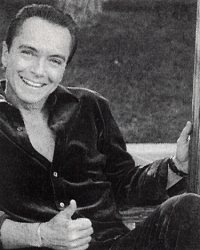
Cassidy very much questions the lack of government responsibility in the battle against AIDS. 'We as a planet have an obligation and a responsibility to ourselves to say, 'If we're going to designate X amount of dollars for the machinery to kill human beings, we should set aside the same amount of dollars to keep people living.' And that means for cancer, leukemia, and AIDS. We need to focus on a vaccine for AIDS.' He argues for a pill or shot so that we can say, 'There, I'm immune. I can never get that.'
'Certainly there've been enough advances in the last five years that have assisted AIDS patients far more than there had been in the prior fifteen. From my perspective things are getting better; at least the people I know who have it are healthier, actually functioning and [living] normal lives. And that's the good news,' David says in a calm voice generating a partial smile. 'But therein lies the danger of sitting still. It's like our fingers are in the dike. Let's get some serious medical money for research and development. That's the key for the new millennium - to find a cure.'
Photographed by TIM COURTNEY exclusively for A&U
Dann Dulin is Senior Editor of A&U.
This article is in the December 1999 issue of A&U.
To order a copy, call 888-245-4333 or 518-426-9010,
or email mailbox@aumag.org
or write:
A&U Magazine
25 Monroe Street, Suite 205
Albany, NY 11210-2743
USA
